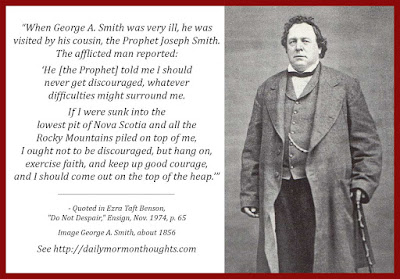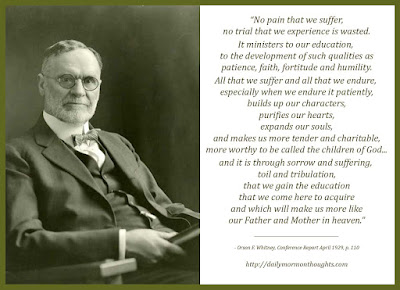"Our choosing the right consistently whenever the choice is placed before us creates the solid ground under our faith. It can begin in childhood since every soul is born with the free gift of the Spirit of Christ. With that Spirit we can know when we have done what is right before God and when we have done wrong in His sight.
"Those choices, hundreds in most days, prepare the solid ground on which our edifice of faith is built. The metal framework around which the substance of our faith is poured is the gospel of Jesus Christ, with all its covenants, ordinances, and principles.
"One of the keys to an enduring faith is to judge correctly the curing time required.... That curing does not come automatically through the passage of time, but it does take time. Getting older does not do it alone. It is serving God and others persistently with full heart and soul that turns testimony of truth into unbreakable spiritual strength."
- Henry B. Eyring, "Mountains to Climb," Ensign, May 2012, pp. 23-26
Click here to read the full talk
It's easy for us to forget how much the seemingly small and inconsequential choices we make ("hundreds in most days") accumulate to create the foundation of all that we are and do in life. President Eyring reminds us of the importance of "choosing the right consistently" through those opportunities in order to "prepare the solid ground" for the "edifice of faith" that we will build upon it. Without the foundation, the edifice can not stand.
The concept of "curing time" is also a very important one. President Eyring makes an analogy in his talk to the curing of cement, from a soft and moldable substance into the hard, rock-like material that sustains a building. "It does take time" for our faith, based on choices and experiences, to cure into the solid strength that will sustain us. And the curing requires more than the passage of time. It requires passing time in the right way, including "serving God and others persistently."
(Compilation and commentary by David Kenison, Orem, Utah, 2021)
August 13, 2016
August 13, 2016


























